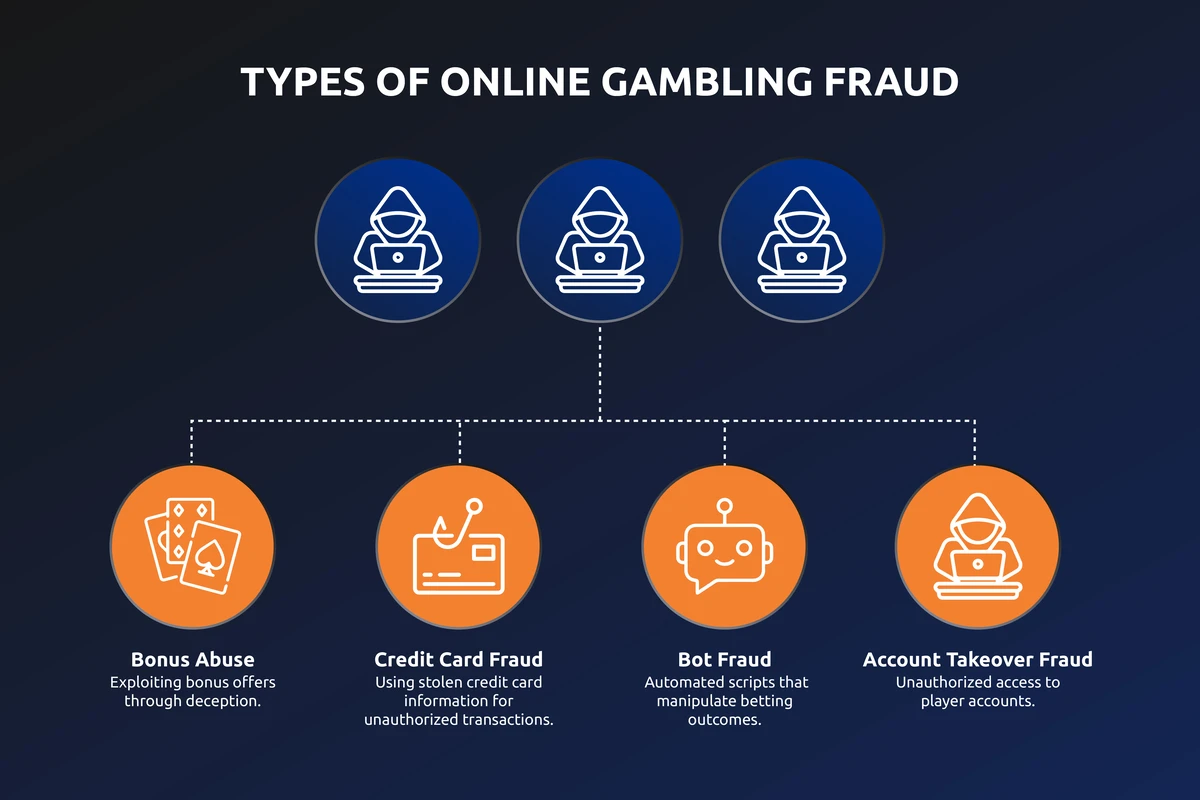A Deep Dive into Risk Management Tools for iGaming Entrepreneurs
How are today’s iGaming businesses enhancing their operations and stakeholder trust with cutting-edge risk management tools? This exploration underscores the synergy between emerging technologies and established risk management frameworks, focusing on project risk analysis and risk analysis methods essential for the iGaming sector. Highlighting the application of business tools for iGaming business, including AI-driven KYC/AML solutions, fraud detection, and analytics for operational efficiency, it emphasizes the importance of a holistic approach to managing the large part of the risk inherent in the gambling industry. The adoption of different approaches to risk, catering to sportsbooks, handling multiple accounts, and ensuring compliance, is key. Utilizing risk management to safeguard against financial fraud, professional players, and regulatory breaches, the system provides an integrated solution to maintain data privacy and build a trustworthy gambling platform.
What do risk management processes include?
Risk management in the iGaming business involves a holistic process designed to identify, analyze, and mitigate potential risks that could compromise the integrity, security, and performance of an online gaming or betting platform. This encompasses a wide array of risks including fraudulent activities, regulatory non-compliance, cyber threats, financial discrepancies, and the safeguarding of bettor’s data privacy. The goal is to protect the platform and its users from potential losses, ensuring a safe, secure, and fair gaming experience for all parties involved.
How are emerging technologies reshaping traditional risk management frameworks in the iGaming industry?
Emerging technologies are playing a pivotal role in reshaping how risk management is approached in the iGaming industry. Companies like Greco are at the forefront, utilizing cutting-edge AI-powered solutions to address complex risk management challenges. According to Greco, these technologies offer sophisticated analytics, predictive models, and real-time monitoring capabilities that significantly enhance the efficiency and effectiveness of risk management strategies. These innovations not only streamline manual processes but also provide immersive insights into betting behavior, allowing for proactive measures against fraudulent activities and other vulnerabilities.

Identify the Risks and Types of Risk Management Tools
Identifying risks and selecting appropriate risk management tools are key steps in fortifying iGaming businesses against various threats. These tools are not just about safeguarding the platform, they also ensure that operations like sportsbooks run smoothly, aligning with regulatory standards and user expectations. Part of effective risk management involves a strategic approach to using these tools, integrating them seamlessly into daily operations. This strategy enables businesses to preemptively address issues before they escalate, ensuring the integrity and reliability of the gaming experience. By prioritizing these aspects, iGaming platforms can maintain a competitive edge, foster trust among users, and navigate the complexities of the digital gambling landscape with confidence.
KYC (Know Your Customer) Verification Tools
- Enhanced Fraud Detection: By integrating AI, KYC tools can more accurately identify discrepancies and fraudulent patterns, significantly reducing the likelihood of financial fraud.
- Improved Customer Experience: Automated verification processes provide a seamless and rapid onboarding experience for users, thereby enhancing player satisfaction.
- Global Regulatory Compliance: AI-powered KYC solutions can adapt to varying international regulations, ensuring that platforms meet the diverse compliance requirements across multiple jurisdictions.
Enhancing iGaming Security with Sumsub KYC Solutions
Sumsub’s KYC solutions leverage artificial intelligence to significantly enhance fraud detection and customer experience in the iGaming sector. Their approach ensures rapid verification, adherence to global regulations, and a reduction in fraud, critical for securing platforms and improving user satisfaction.
- Rapid Player Onboarding: Sumsub facilitates the onboarding of players from over 220 countries in under 30 seconds, showcasing their efficiency in managing large volumes of verifications. Their system supports various document types and languages, promoting global inclusiveness.
- Operational Efficiencies: Implementations by Kaizen Gaming and others illustrate substantial improvements, such as increased onboarding automation and higher user pass rates, underlining the practical benefits of Sumsub’s technology.
Sumsub’s integration into iGaming operations not only assures compliance with diverse global regulations but also provides a seamless customer experience, crucial for maintaining competitiveness and user trust in the dynamic online gambling industry.
How is the integration of artificial intelligence in KYC tools enhancing fraud detection and customer experience in iGaming?
The integration of artificial intelligence (AI) in KYC verification tools is revolutionizing risk management in the iGaming sector by significantly enhancing fraud detection and optimizing customer experience. By employing sophisticated algorithms and pattern recognition, these cutting-edge tools can swiftly identify discrepancies that may indicate fraudulent activity. This not only minimizes the risk of financial loss but also streamlines the verification process, ensuring that legitimate users can access the platform quickly and efficiently. Moreover, AI-driven KYC solutions can navigate the complex matrix of global regulatory landscapes, customizing verification protocols to meet the specific requirements of different regulated markets, thus ensuring compliance and minimizing the risk of regulatory penalties.
In what ways can KYC verification tools adapt to handle the diversity of global regulatory requirements effectively?
KYC verification tools, especially those powered by AI, have the unique ability to adapt to and fulfill the diverse regulatory requirements pervasive in the iGaming industry. They achieve this through several mechanisms:
- Regulation-Specific Customization: These tools can be configured to adhere to the specific KYC and AML (Anti-Money Laundering) guidelines of each market, ensuring compliance with local and international laws.
- Dynamic Data Analysis: They continuously analyze emerging regulatory trends and adjust their verification processes accordingly, thereby safeguarding platforms against future regulatory changes.
- Multi-Language Support: To cater to a global audience, AI-powered KYC solutions offer multi-language support, crucial for understanding and processing identification documents from various countries.
Through these advanced features, KYC verification tools play a pivotal role in managing risk across different jurisdictions, thereby protecting both operators and bettors from potential legal and financial repercussions. This positions them as an indispensable component of any comprehensive risk management strategy in the dynamic iGaming landscape.
AML (Anti-Money Laundering) Solutions
Efficiently managing the risks in online gambling and sports betting merges diligence with the latest technology and a commitment to fairness. This approach is crucial for areas like Anti-Money Laundering (AML) and Responsible Gaming, which are at the forefront of risk management in the iGaming industry. With the evolution of digital tools, iGaming businesses now have more sophisticated methods to combat challenges like money laundering. These methods not only ensure regulatory compliance but also safeguard the platform’s integrity by preemptively identifying and mitigating fraudulent activities.
- Comprehensive Data Analytics: AML solutions leverage the power of big data analytics to scrutinize vast volumes of transaction data. This enables the detection of suspicious patterns that may indicate money laundering activities.
- Real-Time Monitoring and Transaction Analysis: Continuous monitoring of player activities and transactions plays a pivotal role in identifying and mitigating risks proactively. By analyzing transactions in real-time, AML tools can quickly flag and address potential issues before they escalate.
- Adaptation to Regulatory Changes: With the legal framework surrounding online gambling constantly evolving, AML solutions are designed to adapt swiftly to new regulatory requirements, ensuring compliance across different jurisdictions.
How do AML solutions in the iGaming sector leverage big data analytics to predict and prevent sophisticated money laundering activities?
One standout tool in this domain is SEON, which utilizes sophisticated algorithms to analyze transactional and player data. By identifying patterns and correlations that would be impossible for the human eye to detect, these systems can predict potential money laundering activities with remarkable accuracy. This not only aids in preempting fraudulent activities but also ensures that iGaming platforms remain within the bounds of legal compliance, safeguarding their reputation and operational integrity.
What role do continuous monitoring and real-time transaction analysis play in enhancing AML efforts in iGaming?
Continuous monitoring and real-time transaction analysis are the cornerstones of effective AML efforts within the iGaming sector. By keeping a vigilant watch over player activities and financial transactions around the clock, these systems offer an unparalleled ability to detect anomalies that could signify money laundering or other illicit activities. This vigilance ensures that any suspicious behavior triggers an immediate alert, facilitating prompt investigation and resolution, thereby significantly diminishing the window of opportunity for fraudsters and ensuring a safer gambling environment.
Responsible Gaming and Self-Exclusion Tools
Responsible gaming is an ethos that underscores the necessity of maintaining a balanced and ethical approach to online gaming and betting. It’s about recognizing the fine line between entertainment and addiction and having the tools in place to support players in staying on the right side of this boundary.
- Machine Learning Intervention: By harnessing machine learning algorithms, iGaming platforms can now detect early signs of problem gambling. This proactive approach allows for timely interventions, offering players the guidance and support they need to address their gambling behaviors.
- Innovative Self-Exclusion Options: Modern self-exclusion tools are becoming increasingly user-friendly and accessible, allowing players to set their limits or temporarily exclude themselves from gaming activities with ease.
How are iGaming platforms utilizing machine learning to identify and intervene in cases of problem gambling more effectively?
As previously mentioned, machine learning empowers iGaming platforms to analyze player behavior patterns and identify individuals potentially at risk of developing gambling-related issues. By identifying such patterns early, operators can intervene with targeted support and resources designed to encourage responsible gaming practices. This might include custom notifications, direct outreach from support teams, or the automatic triggering of self-exclusion mechanisms for those identified as at risk. This advanced approach not only protects individuals but also reinforces the platform’s commitment to responsible gaming.
In what innovative ways are self-exclusion tools being designed to ensure they are more accessible and effective for users?
Self-exclusion tools have evolved significantly, with iGaming platforms now offering features such as adjustable time periods for exclusion, tailored limits on deposits and wagering, and even the integration of external support services. These tools are designed to be straightforward, ensuring that players can easily set their preferences without navigating through complicated processes. Moreover, with the advent of mobile and web applications dedicated to promoting responsible gambling, players have more resources at their fingertips than ever before, making it easier to maintain control over their gaming activities.

Fraud Detection and Prevention Systems
In the iGaming industry, finding effective strategies and cutting-edge technologies to tackle fraud and manage payment risks is essential. As the popularity of online gaming and sportsbooks surges, so does the allure of fraudulent activities, making it critical for businesses to adopt robust fraud detection and prevention systems. These systems are not just tools; they are integral to the risk management efforts that safeguard the operations and financial health of iGaming platforms.
- Cross-Platform Data Integration: By unifying data across various platforms, iGaming operators can achieve a holistic view of player activities, further enhancing the ability to detect suspicious activities.
- Advancements in Pattern Recognition and Anomaly Detection: Modern fraud detection systems leverage state-of-the-art machine learning algorithms to identify inconsistent patterns and behaviors indicative of fraudulent actions.
How can iGaming platforms integrate cross-platform data to enhance fraud detection capabilities?
The integration of cross-platform data allows iGaming platforms to aggregate and analyze user activities and transactions from multiple sources. This comprehensive approach enables the identification of complex fraudulent schemes that may not be evident when analyzing data from a single source. For instance, SEON’s insights on online gambling fraud highlight the importance of using diverse data points to uncover sophisticated fraud attempts. By continuously monitoring and comparing data across different platforms, iGaming operators can swiftly detect and mitigate fraudulent activities, ensuring a safe and secure gaming environment for their users.
What advancements in pattern recognition and anomaly detection are setting new standards in iGaming fraud prevention?
The advancements in pattern recognition and anomaly detection technologies are revolutionizing fraud prevention in the iGaming industry. Utilizing algorithms capable of sifting through vast datasets in real-time, these systems can pinpoint irregularities and patterns that deviate from the norm, which are indicative of fraudulent behavior. Regulatory bodies, such as the UK Gambling Commission (UKGC), increasingly mandate the use of such sophisticated risk management processes to bolster the industry’s defense against fraud. By setting rigorous standards and auditing the fraud detection mechanisms of iGaming platforms, regulators are ensuring that these advancements play a pivotal role in maintaining the integrity of the industry.
Navigating Self-Exclusion with GAMSTOP under UKGC Regulation
The GAMSTOP program, endorsed by the UK Gambling Commission (UKGC), showcases a consumer-focused approach to responsible gambling. By registering with GAMSTOP, individuals can self-exclude from all online gambling sites licensed in Great Britain, ensuring a significant step towards self-regulation and protection from gambling harm. This process is straightforward: once a person, for instance, “Bobby,” decides to self-exclude through GAMSTOP at one casino, he is automatically excluded from all other online casinos licensed under the UKGC, without the need for separate requests. This unified approach underscores the UK’s commitment to safeguarding individuals against gambling-related risks and highlights the effectiveness of collective action in promoting responsible gambling practices.

Payment Risk Management Solutions
In the iGaming world, managing payment risk is fundamental due to the high volume and velocity of transactions. Implementing robust payment risk management solutions is crucial for iGaming platforms, to mitigate financial risks and ensure transactional integrity. These practices form a critical part of the risk management framework, playing a pivotal role in maintaining operational security and trust. By integrating advanced risk management tools, iGaming businesses can safeguard against payment fraud, emphasizing the essential role these solutions play in the betting business’s ecosystem.
- Managing High-Volume Transactions: Strategies such as setting transaction limits and conducting real-time monitoring help manage the risks associated with high-volume transactions.
What strategies are being implemented to manage the risks associated with high-volume, high-velocity transactions in iGaming platforms?
To effectively manage the risks tied to high-volume, high-velocity transactions, iGaming platforms are adopting a multi-faceted approach, incorporating both technological solutions and strategic processes. Real-time transaction monitoring is one such strategy, enabling immediate detection of suspicious transaction patterns that could indicate fraud or money laundering. Additionally, implementing transaction limits and loss limits helps mitigate financial risk by capping the amount that can be transacted or lost within a predefined timeframe. These measures not only safeguard the platform and its users from potential financial losses but also ensure compliance with regulatory standards, reinforcing the platform’s reputation as a trustworthy and secure betting operator.
Enhancing iGaming Financial Security: Strategies for Managing High-Volume Transactions
In the iGaming sector, managing the risks associated with high-volume and high-velocity transactions is paramount for business-to-business (B2B) operations. iGaming platforms are increasingly leveraging advanced technological solutions and strategic processes to safeguard their operations and maintain compliance with stringent regulatory standards. Real-time transaction monitoring serves as a cornerstone strategy, providing an immediate lens into potentially fraudulent or anomalous transaction patterns. By setting transaction and loss limits, platforms can further mitigate financial risk, ensuring operations remain within the bounds of regulatory compliance and reinforcing their status as secure and reliable operators.
Tailoring Strategies to Market Specifics: The Sweden Example
To illustrate the practical application of these strategies, consider the operation of an online casino in the Swedish market. Understanding the average new deposits per user (ANDPU) is crucial; for instance, if the ANDPU in Sweden is 60 EUR, establishing a minimum deposit threshold of 20 EUR can significantly enhance risk management.
This strategy not only deters players seeking to exploit the system but also effectively filters out potential scammers. Setting a minimum deposit limit, combined with intelligent wagering requirements, serves as a robust mechanism to exclude bonus hunters, thus safeguarding the platform’s financial health and integrity.
This example underscores the importance of adopting market-specific insights to refine risk management strategies, ensuring that iGaming platforms can operate efficiently and securely within their targeted geographies.
By embracing these comprehensive approaches, iGaming platforms can navigate the complexities of high-volume transactions, adapting to market dynamics and regulatory requirements to maintain a competitive edge in the B2B landscape.
Cybersecurity Solutions
Cybersecurity in the iGaming sector is crucial, involving a dynamic response to ever-evolving threats. With the industry’s rapid growth, ensuring top-notch security and compliance is paramount, particularly for handling financial transactions and personal data. This sector, demands rigorous cybersecurity and regulatory adherence to protect operations and maintain user trust. Cybersecurity solutions and compliance tools are not just important; they’re an essential part of the infrastructure, playing a crucial role at every stage of risk management. These measures are central to the operational integrity of iGaming businesses, positioning them as market-leading by securing every aspect of the betting business.
- Encryption Technologies: At the forefront, encryption stands as the guardian of data confidentiality. Utilizing advanced encryption standards (AES) ensures that sensitive player information and financial transactions are encrypted to the highest degree, rendering them illegible to unauthorized access.
- Secure Sockets Layer (SSL) Certificates: SSL certificates are essential for establishing a secure connection between a user’s browser and the iGaming platform. This security protocol is crucial in preventing data breaches during the transmission of personal and financial information.
- Firewalls and Intrusion Detection Systems (IDS): These act as a primary line of defense, monitoring and controlling incoming and outgoing network traffic based on predetermined security rules, while IDS monitors suspicious activities within the network, providing real-time threat detection.
In the realm of iGaming, cybersecurity frameworks are evolving in response to sophisticated cyberattacks. The enforcement of comprehensive cybersecurity measures is imperative not only for compliance but also for maintaining user trust and financial integrity.
How are cybersecurity frameworks in iGaming evolving to counter the threat of sophisticated cyber attacks and data breaches?
Cybersecurity frameworks in the iGaming industry are rapidly evolving to tackle sophisticated cyber threats and data breaches. This evolution is marked by the adoption of advanced technologies such as artificial intelligence for predictive threat detection, blockchain for enhanced transaction security, and zero-trust architectures that scrutinize every access request. These strategies represent a shift from reactive security measures to a proactive, integrated approach. By embedding security into every layer of iGaming operations, from game development to user interactions, the industry aims to stay ahead of cybercriminals, ensuring a safe and trustworthy environment for users. This continuous adaptation reflects the industry’s commitment to safeguarding its digital landscape against emerging cyber challenges.
Streamlining Cybersecurity and Compliance in iGaming
Cybersecurity is paramount in the iGaming industry, ensuring the protection of financial transactions and personal data through technologies like encryption, SSL certificates, and firewalls. The sector’s move towards AI, blockchain, and zero-trust models exemplifies a shift to proactive defense mechanisms against cyber threats.

Adopting vs. Building iGaming Platforms: A B2B Insight
For businesses entering the iGaming market, the choice between developing an in-house platform or adopting a Turnkey solution is pivotal. Building a platform from scratch is a significant investment, often requiring millions of dollars and years of development, along with a dedicated focus on cybersecurity risk mitigation.
Conversely, opting for Turnkey solutions from providers such as Digitain, Betconstruct, or NuxGame offers a streamlined route into the market. These providers bear the responsibility for cybersecurity, allowing operators to concentrate on business growth without the direct burden of complex security measures. This approach simplifies the entry into the iGaming world, providing a secure and compliant infrastructure that meets industry standards.

Navigating Regulatory Compliance
The legal landscape of the iGaming industry demands agile compliance tools capable of adapting to various jurisdictions. Automation and advanced technologies in compliance tools facilitate real-time adherence to regulations, ensuring businesses stay ahead of legal requirements and maintain operational integrity.
Ultimately, whether building an iGaming platform or partnering with a Turnkey provider, prioritizing cybersecurity and compliance tools is essential for safeguarding operations and gaining competitive advantage in the B2B iGaming sector.
Regulatory Compliance and Reporting Tools
The iGaming industry is governed by a labyrinth of regulations that differ across jurisdictions, necessitating agile and robust regulatory compliance tools to navigate this complex landscape.
- Compliance Monitoring and Management Software: These platforms provide a unified view of compliance status across multiple jurisdictions, simplifying the management of regulatory obligations and minimizing the risk of non-compliance penalties.
- Automated Reporting Tools: Automation in compliance reporting is a game-changer, enabling iGaming businesses to efficiently compile and submit the required reports to regulatory bodies. This not only saves time but also ensures accuracy and timeliness in compliance reporting.
- AML and KYC Verification Solutions: With stringent Anti-Money Laundering (AML) and Know Your Customer (KYC) regulations in the iGaming sector, these tools play a critical role in verifying player identities and detecting suspicious activities, thereby preventing financial crimes.
Adapting to the rapidly changing legal landscape requires a proactive approach, integrating advanced regulatory compliance tools that can evolve in tandem with legislative amendments.
How are regulatory compliance tools adapting to manage the rapidly changing legal landscape of the iGaming industry across different jurisdictions?
Regulatory compliance tools in the iGaming industry are advancing rapidly, integrating AI to automate compliance, using blockchain for transaction transparency, and employing data analytics for predictive risk management. These tools are designed to be adaptable across various jurisdictions, ensuring platforms can swiftly align with new regulations. The emphasis on technology facilitates efficient, real-time adherence to legal standards, reducing fraud and enhancing compliance, especially in anti-money laundering efforts.
Navigating Partner Selection in the iGaming Industry
In the iGaming field, regulatory compliance and reporting tools are indispensable for navigating the complex regulatory landscape that varies across jurisdictions. These tools, are fundamental in managing the legal and operational challenges inherent in the industry. They offer a unified view of compliance status, streamline the submission of required reports, and ensure rigorous verification processes to prevent financial crimes, adapting proactively to the swiftly changing legal frameworks.
The Importance of Partner Compliance in the iGaming Ecosystem
However, the journey to regulatory adherence extends beyond individual business efforts. The choice of partners—platform providers, game operators, and other third parties—plays a critical role in ensuring seamless regulatory compliance and operational success. This is particularly true when considering the licensing requirements set forth by regulatory bodies such as the Malta Gaming Authority (MGA).
When initiating an online casino or other forms of iGaming businesses, it’s not merely about obtaining a license for your operation. The legal landscape dictates that your partners must also be in compliance with similar regulatory standards. For example, if you aim to secure an MGA license for your B2C operation—be it an online casino, sports betting platform, or lottery service—you must ensure that your platform provider possesses the necessary B2B MGA license. Without this, acquiring a license for your own business becomes a significantly more complex, if not impossible, task.
This requirement underscores a broader principle: the regulatory framework within the iGaming industry mandates adherence to specific operational and compliance standards, not just for individual entities but across the entire partner network. Essential features such as self-exclusion systems (e.g., GAMSTOP for the UKGC) and games certified according to MGA standards must be integrated into the platform, reflecting the regulatory imperatives that shape the operational baseline for iGaming businesses.
Strategic Partnerships & Licensing: Accelerate Your iGaming Success
Selecting the right partners and obtaining the appropriate licenses are pivotal steps for any iGaming operation. These decisions should strategically align with your business goals and regulatory requirements. License Gentlemen specializes in streamlining this process, guiding you to secure licenses from critical jurisdictions such as Anjouan, MGA, Isle of Man, and Kahnawake, ensuring your operation complies with global standards. Our expertise not only simplifies the licensing journey but also aids in choosing partners that enhance your platform’s value and longevity. Partner with License Gentlemen to navigate the complex regulatory landscape confidently and position your iGaming business for success. Contact us for a strategic consultation tailored to your needs.
Business Intelligence and Analytics
In the competitive iGaming industry, leveraging insightful data is not just a technological exploit but a strategic necessity. The adept use of Business Intelligence (BI) and Analytics embodies the convergence of technology and business farsightedness, enabling online casinos and sportsbooks to navigate through the complexities of the market while enhancing operational efficiency and player engagement. The integration of BI and Analytics in iGaming transcends basic data analysis; it’s about transforming raw data into actionable insights that drive profitability, reduce financial risks, and tailor the gaming experience.
- Operational Efficiency and Decision Making: Utilizing BI tools like Metabase, PowerBI, and Microstrategy, iGaming platforms can pinpoint operational inefficiencies, streamline project management, and optimize financial risk analysis. These software solutions aggregate data across the entire system, allowing managers to make informed decisions swiftly, a critical capability in the fast-paced gambling and gaming industry.
- Risk Management and Fraud Detection: Advanced analytics provide the backbone for betting risk management by identifying patterns indicative of betting fraud or risky players. Through techniques of risk management and risk identification tools, platforms safeguard their business from potential threats, ensuring compliance with regulations and policies. To enhance these efforts, iGaming operators can leverage specialized tools like TheGreco and Sumsub. TheGreco offers targeted risk management solutions to preemptively identify and mitigate betting fraud risks. Sumsub complements these capabilities with robust identity verification and compliance services, streamlining KYC and AML processes. Together, they equip operators with the means to secure their platforms against fraud while adhering to regulatory standards, ensuring a trusted gaming environment.
- Player Behavior Analysis for Game Development: Analytics offer a lens into the preferences and behaviors of players, enabling gaming companies to enhance game design and create engaging content. Insights into player interactions can drive the development of personalized marketing efforts, ultimately improving player retention and loyalty.
How is business intelligence being used to drive strategic decision-making and optimize operational efficiency in iGaming?
Business intelligence (BI) in iGaming harnesses data analytics and predictive modeling to improve decision-making and boost operational efficiency. By predicting player behaviors and market trends, BI enables tailored gaming experiences and optimized marketing strategies, directly impacting revenue growth. Operational improvements are identified through data analysis, leading to cost reduction and enhanced player satisfaction. Additionally, integrating AI with BI facilitates rapid insights, allowing for agile adaptation to market changes. This strategic use of BI not only refines customer engagement through personalized experiences but also ensures that iGaming platforms stay competitive and responsive to dynamic industry demands.
In what ways can analytics provide insights into player behavior, improving game design and personalizing marketing efforts?
Analytics provide deep insights into player behavior, enabling iGaming platforms to enhance the game design and tailor marketing strategies effectively. By analyzing player data, platforms can develop personalized games and promotions, fostering greater player engagement. This approach highlights the importance of customer-centric innovation in the gaming sector. Business Intelligence (BI) and Analytics are crucial in the iGaming industry, supporting everything from sports betting software to online casinos. They facilitate a comprehensive understanding of player interactions, risk analysis processes, and market trends, allowing iGaming businesses to adapt and excel in a competitive landscape. These tools are key to driving strategic decisions, managing risks, and ensuring the sector’s growth by delivering engaging gaming experiences.
As the iGaming industry evolves, the strategic use of BI and Analytics will continue to be vital in predicting and shaping market dynamics, demonstrating their significant impact on the future of gaming.
Leveraging CRM Tools for Enhanced Player Engagement in iGaming
“In what ways can analytics provide insights into player behavior, improving game design and personalizing marketing efforts?”
Analytics provide deep insights into player behavior, enabling iGaming platforms to enhance the game design and tailor marketing strategies effectively. By analyzing player data, platforms can develop personalized games and promotions, fostering greater player engagement. This approach highlights the importance of customer-centric innovation in the gaming sector. Business Intelligence (BI) and Analytics are crucial in the iGaming industry, supporting everything from sports betting software to online casinos. They facilitate a comprehensive understanding of player interactions, risk analysis processes, and market trends, allowing iGaming businesses to adapt and excel in a competitive landscape. These tools are key to driving strategic decisions, managing risks, and ensuring the sector’s growth by delivering engaging gaming experiences.
Enhancing this analytical approach, CRM tools like FastTrack CRM, Optimove CRM, and Solitics CRM utilize AI and predictive analytics to deeply understand each player’s behavior, allowing for highly personalized gaming experiences. For instance, consider a player, John, who typically engages in a crash game for five minutes daily. Without CRM tools, John’s interaction might end there. However, with these tools, iGaming platforms can proactively offer John VIP bonuses after four minutes of play or unlock exclusive games for him. Such tailored interventions can significantly extend John’s session duration on the website, potentially increasing the platform’s earnings by 3-4 times.
As the iGaming industry evolves, the strategic use of BI, Analytics, and CRM tools will continue to be vital in predicting and shaping market dynamics, demonstrating their significant impact on the future of gaming.

How Risk Management Helps iGaming Business
In the vibrant and ever-evolving landscape of the iGaming industry, standing out amidst the competition and earning the trust of the user base is paramount for success. Central to achieving these goals is the implementation of a robust risk management framework. Through thoughtful integration of risk management software and tools tailored for the iGaming business, operators can not only safeguard their platforms against various financial and operational vulnerabilities but also position themselves as trusted, reliable entities in this highly competitive market.
It’s an undeniable fact that risk is an inseparable aspect of the iGaming industry, touching upon factors like operational integrity, regulatory compliance, and player engagement. Embracing risk management isn’t just about mitigating potential threats; it’s a strategic move that differentiates market leaders from the rest.
How does implementing a robust risk management framework translate into competitive advantage and trust-building among users in the iGaming industry?
Let’s delve into how embracing risk management tools and methodologies equips iGaming platforms to outmaneuver competitors and build lasting relationships with users:
- Enhancing User Trust Through Transparency: Trust is the cornerstone of user engagement in the online gaming world. By implementing risk management practices, iGaming businesses can assure users of the integrity of their operations, safeguarding personal and financial data. Methods like risk assessment software enable platforms to demonstrate compliance with the highest security standards, a factor that greatly appeals to savvy users.
- Competitive Advantage via High-level Risk Management: By employing advanced risk management software, iGaming operators can efficiently prevent and mitigate fraud, ensure regulatory compliance, and manage financial risk analysis more effectively. This operational excellence allows for a smoother user experience, free from the interruptions of service breaches or compliance issues. The result is a competitive edge in a crowded market, as platforms can offer uninterrupted high-quality service.
- Optimizing Business Operations: Effective risk identification techniques and the use of a comprehensive risk analysis framework allow for the early detection of potential threats and vulnerabilities within the iGaming ecosystem. This preemptive approach ensures that platforms can swiftly adapt and respond, minimizing disruptions and protecting the business’s financial interests. Furthermore, the audit trail provided by these systems supports an organization in refining its operational strategies and achieving business objectives with defined risk parameters.
- Personalizing User Experiences: The adoption of risk assessment tools aids in understanding the behavior patterns of users, including their spending habits and game preferences. This insightful data enables iGaming businesses to tailor their offerings and marketing strategies to individual user needs, enhancing user satisfaction and loyalty. By personalizing experiences, platforms minimize the risk associated with user churn and maximize engagement and profitability.
- Regulatory Compliance and Agility: The dynamic legal landscape of the iGaming industry, especially in jurisdictions like Malta, demands versatile risk management frameworks. By utilizing risk assessment checklists and compliance management software, platforms ensure that they remain on the right side of regulations, adapting quickly to legal changes. This agility not only prevents potential legal challenges but also ensures uninterrupted service to users, bolstering the platform’s reputation and user trust.
By incorporating these comprehensive risk management strategies, iGaming companies not only shield their platforms from potential threats but also enhance their operational efficiency, user engagement, and regulatory compliance. It’s this holistic approach to risk, coupled with the strategic use of risk management tools, that enables iGaming platforms to turn potential vulnerabilities into opportunities for growth and trust-building among their user base.
Conclusion
In the dynamic iGaming sector, leveraging sophisticated risk management tools and strategies is crucial for operational excellence and stakeholder trust. This entails the strategic use of business tools for iGaming, engaging risk managers, and adopting diverse risk analysis methods to tackle challenges from regulatory compliance to safeguarding user data. It’s vital for platforms, especially sportsbooks and those in the betting industry, to integrate robust risk management practices, ensuring security, compliance, and competitive advantage. For businesses aiming to fortify their frameworks, reaching out for expert guidance is key. By tailoring risk management solutions to the unique demands of the iGaming environment, platforms can navigate this complex landscape successfully. To explore advanced risk management strategies for your iGaming business and secure a competitive edge, do not hesitate to contact us for specialized support.













Comments(0)